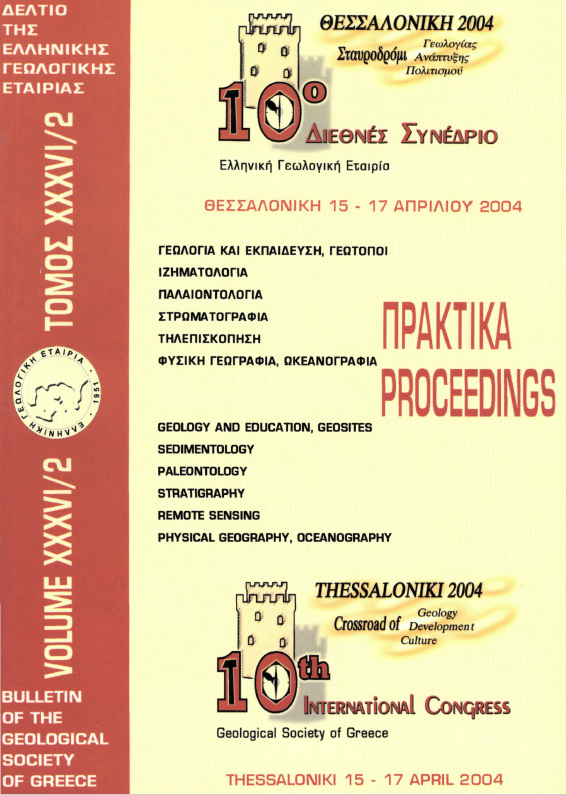Η ΔΙΔΑΣΚΑΛΙΑ ΤΗΣ ΓΕΩΛΟΓΙΑΣ ΣΤΗ ΜΕΣΗ ΕΚΠΑΙΔΕΥΣΗ ΣΤΗΝ ΕΛΛΑΔΑ: ΜΙΑ ΔΙΑΧΡΟΝΙΚΗ ΘΕΩΡΗΣΗ ΚΑΙ ΠΡΟΤΑΣΕΙΣ ΓΙΑ ΤΟ ΜΕΛΛΟΝ
Περίληψη
Στην παρούσα εργασία γίνεται μία θεώρηση της διδασκαλίας των μαθημάτων της γεωλογίας και της γεωγραφίας στη Μέση Εκπαίδευση στην Ελλάδα, η οποία καλύπτει τη χρονική περίοδο μεταξύ 1899-1999. Η μεθοδολογία εργασίας που εφαρμόσθηκε ήταν η ακόλουθη: ανατρέξαμε στα Φύλλα Εφημερίδων της Κυβέρνησης που αναφέρονται στην Εκπαίδευση και από αυτά ξεχωρίσαμε τα αναφερόμενα στη Μ.Ε. και στα μαθήματα της γεωγραφίας - γεωλογίας. Διακρίνονται τα έτη "σταθμοί" στα οποία ή εισήχθησαν τα αντίστοιχα μαθήματα ή διαφοροποιήθηκαν τα αναλυτικά προγράμματα και περιγράφεται η υφιστάμενη κατάσταση έως το σχολικό έτος 2003-2004. Υποστηρίζεται ότι η ύλη πρέπει να περιλαμβάνει θέματα που σχετίζονται κυρίως με τις φυσικές καταστροφές και τη διαχείριση τους, τη διαχείριση υδάτινων πόρων και ορυκτών υλών, τις διεργασίες στην επιφάνεια της γης που επηρέασαν την εξέλιξη της ζωής έως την εμφάνιση του ανθρώπου καθώς και θέματα διατήρησης των μνημείων της φύσης.
Λεπτομέρειες άρθρου
- Πώς να δημιουργήσετε Αναφορές
-
Σκαρπέλης Ν., Ασημακοπούλου Α., & Μιχαλοπούλου Κ. (2018). Η ΔΙΔΑΣΚΑΛΙΑ ΤΗΣ ΓΕΩΛΟΓΙΑΣ ΣΤΗ ΜΕΣΗ ΕΚΠΑΙΔΕΥΣΗ ΣΤΗΝ ΕΛΛΑΔΑ: ΜΙΑ ΔΙΑΧΡΟΝΙΚΗ ΘΕΩΡΗΣΗ ΚΑΙ ΠΡΟΤΑΣΕΙΣ ΓΙΑ ΤΟ ΜΕΛΛΟΝ. Δελτίο της Ελληνικής Γεωλογικής Εταιρείας, 36(2), 631–638. https://doi.org/10.12681/bgsg.16768
- Ενότητα
- Γεωεπιστήμες στην Εκπαίδευση και Γεώτοποι

Αυτή η εργασία είναι αδειοδοτημένη υπό το CC Αναφορά Δημιουργού – Μη Εμπορική Χρήση 4.0.
Οι συγγραφείς θα πρέπει να είναι σύμφωνοι με τα παρακάτω: Οι συγγραφείς των άρθρων που δημοσιεύονται στο περιοδικό διατηρούν τα δικαιώματα πνευματικής ιδιοκτησίας επί των άρθρων τους, δίνοντας στο περιοδικό το δικαίωμα της πρώτης δημοσίευσης. Άρθρα που δημοσιεύονται στο περιοδικό διατίθενται με άδεια Creative Commons 4.0 Non Commercial και σύμφωνα με την οποία μπορούν να χρησιμοποιούνται ελεύθερα, με αναφορά στο/στη συγγραφέα και στην πρώτη δημοσίευση για μη κερδοσκοπικούς σκοπούς. Οι συγγραφείς μπορούν να: Μοιραστούν — αντιγράψουν και αναδιανέμουν το υλικό με κάθε μέσο και τρόπο, Προσαρμόσουν — αναμείξουν, τροποποιήσουν και δημιουργήσουν πάνω στο υλικό.



